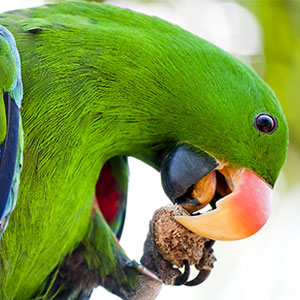
Tips for Feeding Your Bird
What is the best way to feed a parrot? You've heard that feeding your bird a varied diet helps him stay healthy, but are there other simple solutions that turn meal time into a good time, every time? Why, of course there are! Here are some tips that incorporate easily into your daily routine, making breakfast time and beyond smooth sailing for you and your feathered friends.
Primary Diet for Parrots
Whether you decide upon an extruded or fortified seed diet for your birds, maintaining a feeding and cleaning schedule matters greatly. When you follow these simple feeding instructions, it's easy to do a little tidying up at the same time!First of all, wild birds often eat around sunrise and sunset, so recreating this routine may be beneficial to your bird's natural rhythms. When replenishing food, discard leftovers from the previous meal and replace with fresh eats. This keeps your bird's food free from debris and reduces the risk of spoiling. Changing out food is especially important with seed diets, as you might mistake empty, nibbled shells for untouched food. Wipe out your food container and refill about half to three-quarters of the way full, depending upon your bird's eating habits. This simple routine helps maintain cage cleanliness and assures that your bird will have a consistent, fresh diet.
As you're attending to your bird's standard diet, check his water dish. It should contain clean, fresh water free from droppings and food bits. If there is anything in your bird's water, dump out the dirty and replace it. A bird's water dish should be scrubbed every day to avoid scummy build-up – and be sure to use a bird-safe cleaner! Paying attention to your feathers' water will help them stay happy and hydrated on even the hottest days.
Fruits, Vegetables, and other Snacks
Birds love switching it up with fresh eats, and providing garden-grown goodies is a simple way to make your bird's day! Lots of fruits and vegetables are good for birds, including broccoli, spinach, carrots, sweet potatoes, and green beans as well as mango, pineapple, berries, kiwi, and grapes. Try cutting these fruits and veggies into different shapes, giving your bird new textures to try as they savor their fresh favorites. Veggies may also be served cooked, but be sure to let them cool before serving to your bird! Remove cooked foods from the cage after a few hours, as bacteria may begin to grow as the food sits out.Beyond these tasty fruits and veggies, millet, cooked beans and whole grain pasta, and nuts can be great treats. Goodies like these should only make up five to 10 percent of your bird's diet, so save these savory snacks for special occasions or training. While a variety of snacks provide birds with solid nutrition, there are a few to look out for. Never give your bird avocado, onions, garlic, chocolate, apple seeds, salt, caffeine, dried beans, human junk food, or alcohol. Fid's tummies aren't made to digest these bad boys, so save the coffee, beer, chocolate bars, and guacamole for yourself!
Fun Foraging for Food
Looking for another activity to stimulate your bird? Put treats in her toys to create an engaging, fun foraging experience. Hiding treats throughout the cage or in foraging toys will give your bird something to do. The foraging wheel or hiding food inside tough-to-open containers gives her the chance to tear and destroy in a constructive way. In-shell nuts provide a perfect, natural foraging experience. You can also test drive creative ideas for combining foraging with treats. Fresh corn on the cob, for example, gives the bird a good snack and also allows for some destruction. Let us know what innovative ideas for foraging play your bird enjoys!Vitamins for Birds
Birds need vitamins and minerals to keep their whole bodies healthy, but sometimes they don't get all that's necessary from their food. Check your fid's primary diet to see if there are added omega three fatty acids, as well as vitamins A, E, D3, and B-complex. If your bird food lacks these good supplements, you can add bird vitamin powder to their food or water. Carefully observe your bird eating or drinking the vitamin-laced food or water, as some birds dislike its flavor and reject it, leading to malnourishment and dehydration. Remove the vitamin-added food and water in the evening and replace it with plain food and clean water.Another vital element is calcium, which birds can get from cuttlebones. Gnawing at these crumbly surfaces keeps beaks healthy and sharp and provides much-needed calcium.
While vitamins and minerals help birds grow strong, it is possible to overdose on these supplements. Don't give your pet bird vitamin powder if their food is already vitamin-fortified, and if your bird seems sick, check with your avian vet before changing what you feed your favorite feathers.
Finally, when it comes to how to feed your pet bird, you have to get to know your bird! Keep track of how much she usually eats and drinks throughout the day, and pay attention to the consistency of her droppings and liquid emissions. Often, birds that change their eating and drinking habits – or stop eating or drinking all together – are developing an illness and may need medical attention. Additionally, awareness of your bird's normal behavior lets you get closer to her, strengthening the bond you two share! Love your bird by keeping her primary diet consistent and cage clean, feeding her healthy snacks, and maintaining an appropriate vitamin regime! Your feathered friend will thank you!
Our Picky Bird Guarantee
At Great Companions, we understand birds.... and we know, that birds can be picky when it comes to their food, toys and treat! That's why we have the 100% Picky Bird Guarantee!Discover More!
Treats for Both You and Your BirdMy First Bird: What Should I Feed My New Bird?
The Benefits of Millet for Your Bird
Pet Bird Nutrition
Foods That are Toxic to Birds
Return to Bird Articles


